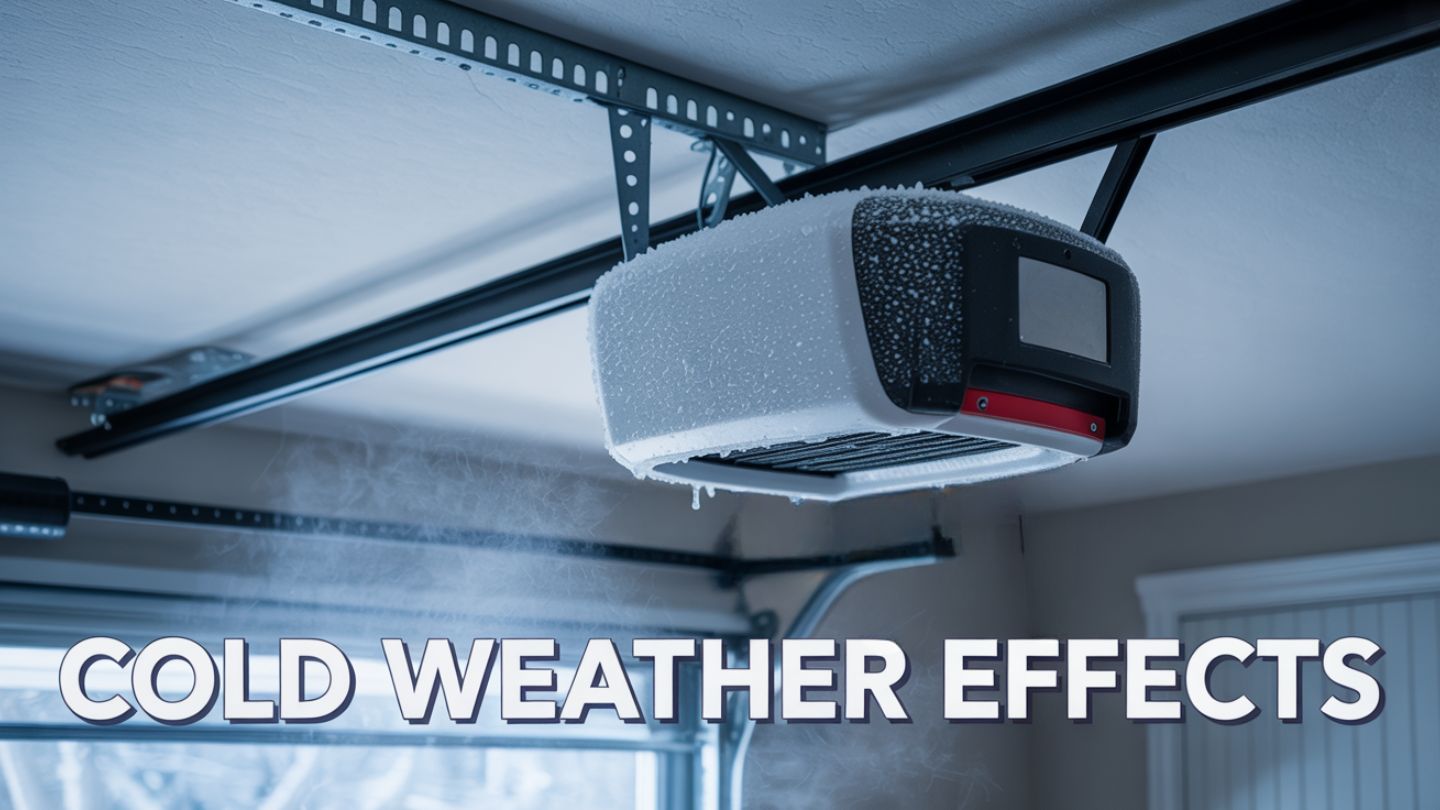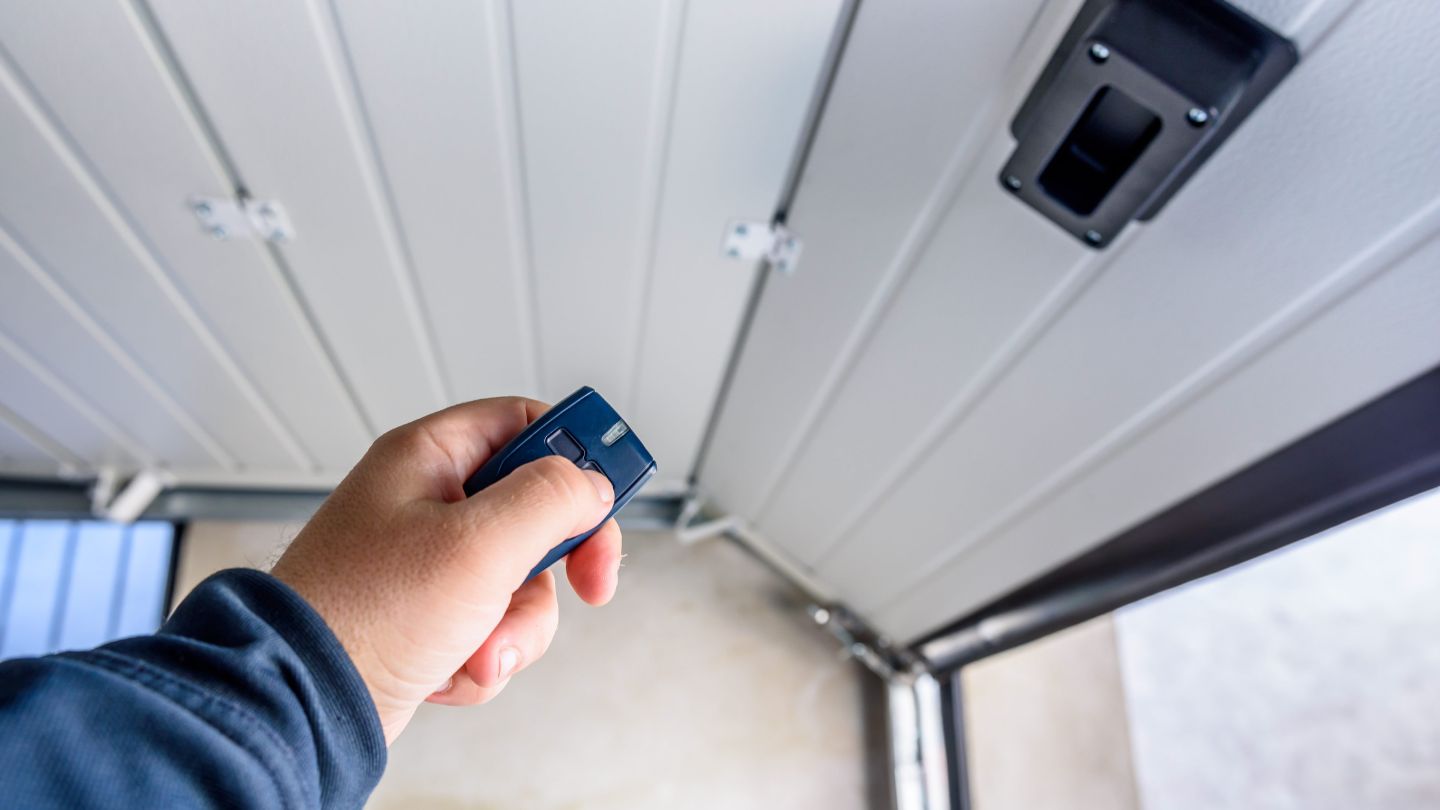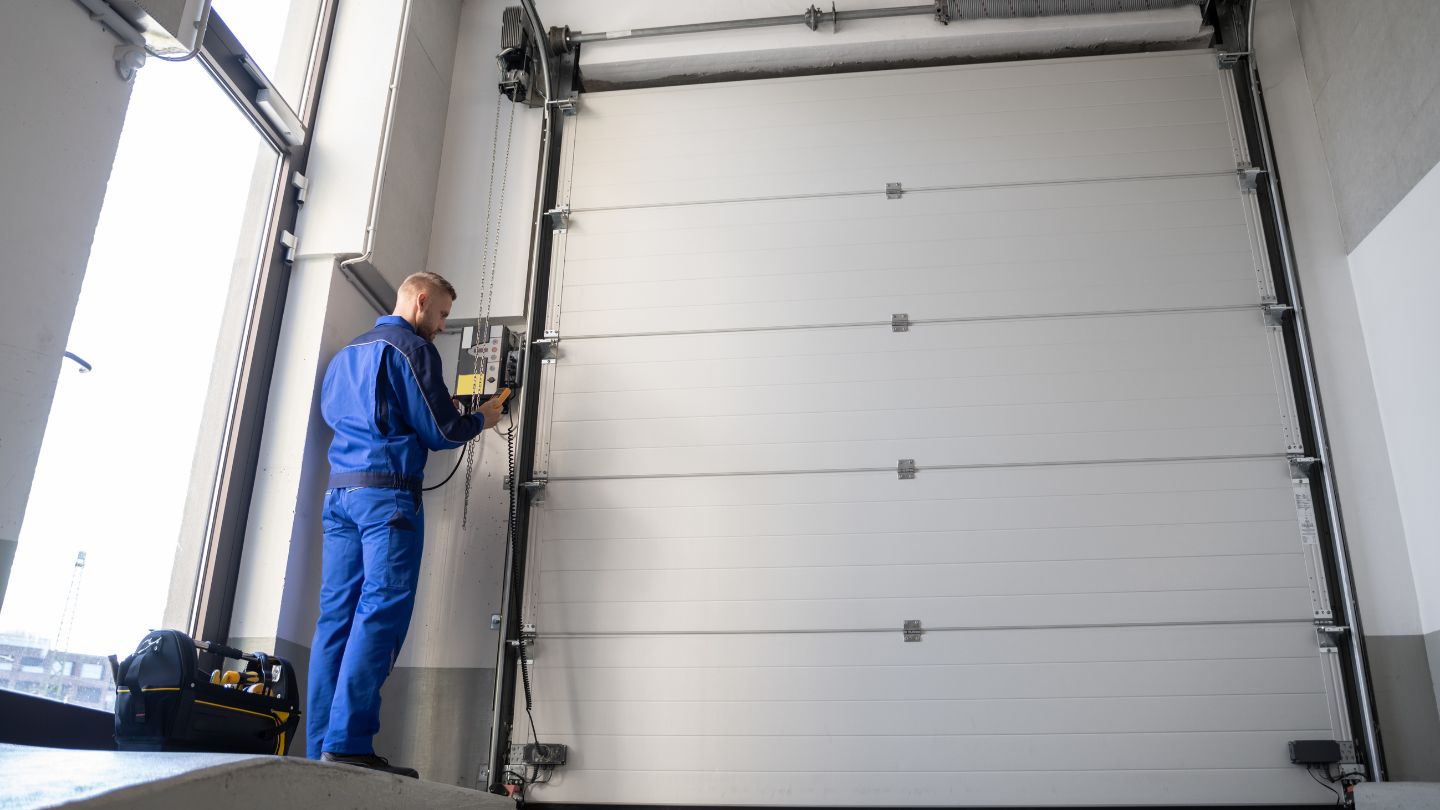
Cold weather can cause your garage door opener to malfunction or freeze. If your garage door isn’t working properly, it could be due to the effects of cold weather on garage door openers. This blog will explore common cold-weather issues and offer tips to keep your garage door opener running smoothly.
As temperatures drop, your garage door opener may suffer from the cold. You might have noticed that your garage doors stick or refuse to open altogether. This is because cold weather can slow down or cause malfunctions in garage door openers due to temperature changes affecting moving parts. Moving parts like springs, cables, and rollers can seize up, becoming stiff and making the garage door system work harder than usual, especially for modern garage doors designed to withstand varying winter temperatures.
Electronic components are not immune either. Colder temperatures can cause wires to become brittle and connectors to fail, leading to operational issues. Ice build-up can further exacerbate these problems by blocking sensors, which are crucial for the proper functioning of garage door openers during extreme cold weather.
Moving parts and electronics aren’t the only components that suffer. The materials of the garage door itself can contract in freezing temperatures, leading to misalignment, warping, or even cracking. All these factors combined can make the cold season particularly challenging for your garage door system, making it important to understand the key factors to consider when installing a new garage door opener to ensure reliable function year-round.
Winter brings a host of potential issues for garage door openers. Cold weather significantly impacts their functionality, leading to various operational difficulties. From frozen lubricants to battery drain and contracting metal parts, each problem can cause significant inconvenience and even require garage door repair.
One of the most common issues is frozen lubricants. Cold weather causes the grease and other lubricants in the garage door system to thicken or freeze, leading to increased friction and potential malfunctions in moving parts. This can put a lot of strain on the motor of the garage door opener, making it work harder and potentially causing it to fail.
Combat this issue by using a silicone-based lubricant, which resists freezing better than other types, and ensure your openers and accessories are serviced to handle cold conditions efficiently. Regularly applying a silicone-based lubricant can help ensure smooth operation even in the coldest temperatures.
Another issue is battery drain in garage door remotes. Cold temperatures lead to quicker battery depletion, affecting the performance of the remotes. You may find that your garage door remote fails more often during the winter months, leaving you stuck outside in the cold.
Regularly checking and replacing the remote batteries before winter can mitigate this issue. Keeping spare batteries in a dry place can also be a lifesaver when your current ones fail.
Cold weather causes metal parts to contract, which can lead to various operational issues. For example, steel garage doors may contract, resulting in:
These issues make the garage door system less reliable in colder weather and can become more apparent as we transition to warmer weather.
Address these issues with regular maintenance and timely repairs, especially when recognizing the signs that tell you when to replace your garage door opener to avoid unexpected breakdowns during cold weather. Replacing worn-out components and ensuring that the garage door is used regularly can help prevent these problems from becoming severe. If necessary, replace any damaged parts to maintain optimal function.

Preventing issues before they arise is always better than dealing with unexpected malfunctions. Proactive maintenance can prevent unexpected repairs and extend the lifespan of a garage door while installing proper tune-up service routines.
Conducting regular checks and proper care during the cold months can significantly improve your garage door opener’s performance, keeping it in top shape.
Frequent inspections are key to maintaining your garage door opener’s condition. Many homeowners tend to overlook this simple yet effective maintenance task. During visual inspections, inspect the following for any signs of wear and tear:
Applying a thin layer of lubricant to moving parts during winter can help mitigate the negative effects of cold weather and dirt. Regular lubrication prevents stiffness and minimizes wear and tear, ensuring smooth operation and reducing moisture buildup.
Silicone-based lubricants are highly recommended for cold-weather maintenance. These lubricants are less likely to freeze and can help maintain the smooth operation of your garage door opener. Applying silicone-based lubricant to tracks, hinges, and other moving parts can minimize the effects of contraction and ensure reliable performance, supported by routine service and repair for long-term efficiency.
Start by cleaning the tracks and hinges with a grease solvent. After that, apply a silicone-based lubricant. This straightforward step can significantly improve your garage door system’s functionality during winter.
Clean photo-eye sensors are crucial for the proper functioning of your garage door opener. Cold weather can cause fogging or ice build-up on the sensors, leading to malfunctions. Regularly checking and cleaning the sensors will help ensure they remain functional during winter conditions.
Regularly clear snow and ice around the sensors and wipe them clean with a soft cloth. This will prevent obstructions and ensure that the infrared beam between the sensors remains unobstructed.

Even with the best efforts, issues can still arise. Troubleshooting common cold-weather problems can restore your garage door opener’s functionality.
From frozen doors to unresponsive remotes, knowing how to address these affected issues can save you time and frustration. If necessary, you can also learn how to open the door manually at this point.
Frozen garage doors are a common issue during the winter months. Ice can form at the base of the doors, causing them to stick to the ground and preventing movement. Address this by using a heat gun at a safe distance to melt the ice around the door, especially in colder areas like Arlington, OH, where freezing temperatures can affect garage door performance. When the temperature drops, water freezes, which can exacerbate the problem.
Alternatively, pouring hot water carefully along the base of the garage door can help thaw the ice without causing damage. Using a hairdryer on a low setting can also be effective in melting ice around a frozen garage door.
Unresponsive garage door remotes are another common issue in cold weather. Cold temperatures can lead to quicker battery depletion, making the remotes less reliable. Regularly replacing the remote batteries and keeping spares on hand can help mitigate this issue.
If the remote still doesn’t work, check the power supply to the garage door opener, since cold temperatures can affect electrical connections. Simple troubleshooting and maintenance can keep your garage door remote functioning well in colder months.

There are times when DIY troubleshooting isn’t enough, and professional help is needed. If your garage door opener continues to malfunction despite your best efforts, it’s time to contact a professional. Professionals can ensure that repairs are conducted safely and according to manufacturer specifications, an important step for homeowners who rely on durable patio entry doors and garage systems to withstand extreme winter conditions. If your garage door opener is over 15 years old, consider a replacement that matches your setup by evaluating which size garage door opener you need for optimal performance and efficiency.
Cold weather can take a real toll on garage door openers, affecting their performance, speed, and reliability. From stiffened lubricants to weakened batteries and frozen components, low temperatures introduce challenges that demand proactive attention. Regular maintenance, proper insulation, and timely repairs are essential to ensure smooth operation and prevent costly breakdowns. Taking preventive action before temperatures drop can help extend the lifespan of your garage door system and maintain year-round functionality.
At Columbus Door Sales, we understand the impact seasonal changes can have on your garage system. If you’re looking for trusted patio entry door and garage door service in Dublin, count on us for dependable solutions that keep your door operating smoothly all winter long. Our expert technicians provide comprehensive maintenance, repair, and inspection services to keep your opener working efficiently, a trusted choice among homeowners in Worthington, OH, during the demanding winter season.
Cold weather can cause your garage door opener to slow down or malfunction because the lower temperatures affect its moving parts and can make electronic components fail. It's essential to keep an eye on the opener during winter to ensure everything operates smoothly.
If your garage door remote fails in the winter, try replacing the batteries since cold weather can drain them quickly. It's also smart to keep spare batteries handy and check the power supply to the opener.
To keep your garage door from freezing shut, regularly clear snow and ice from around it, apply salt or ice melt where it meets the ground, and use silicone-based lubricants on the moving parts. This simple routine can save you from that frustrating freeze-up!
You should call a professional for garage door repair if your troubleshooting steps don’t work. They can ensure the repairs are safe and keep your warranty intact.